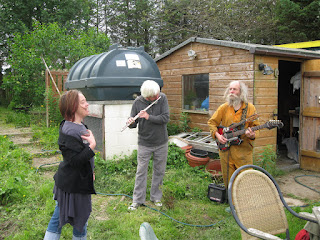Yesterday many gardeners whose plots are producing their first
vegetables celebrated Gardener’s Day. At Cottarton, several of us brought dishes made from vegetables we grew and mushrooms foraged from the woods. Flowers too. The table was laid with crab-apple wine and beer, dandelion wine, salads, chantrelles, fresh potatoes,
sprouted beans. Despite a very cold April and May, with June and July
temperatures resembling November’s, our Earth was still able to produce a
festive bounty. The crowning blessing was the weather --- a balmy 20 degrees:
the first such day for at least two months, brought on a strong southerly wind.
And no rain. Am I too presumptuous to suppose that the Earth thanked us for the
attention we gave her? Even the bees came out of their log and buzzed about us.
We raised our glasses to the Earth, and to Love whose power
brings out the flowers and the fruits that energize us. Then the music began:
Roy, Jake and Charles on their respective instruments and the rest of us
singing. Magda brought each of us a sheaf of barleycorn, tied with coloured
yarn, and led us in the song John Barleycorn a traditional harvest song. Maddie painted all our faces with whatever theme we asked for. When the guests left they took with them garden
produce and flowers from the table.
Gardener’s Day, generally celebrated around July 23 is close
to August 1 the medieval festival of the Gule of August, or Lamas. These days it doesn't make the Daily Mail headlines, but long ago it was a significant celebration of the first harvests. As with most of our present day festivals, its
origins lie with the Celts. August 1 was
Lughnasadh, when the first corn was cut, and the first blueberries picked, corn
rituals performed and marriages. Not only the harvests begin but the first
mushrooms pop up --- but the Celts make no mention of those. It was a religious
festival too. According to Monaghan’s The Encyclopedia of Celtic
Mythology and Folklore,
…a custom Lughnasadh shared with the other Gaelic festivals
was the lighting of bonfires and visiting of holy
wells. The ashes from Lughnasadh bonfires would be used to bless
fields, cattle and people.[14] Visitors to holy wells would
pray for health while walking sunwise around the well. They would then leave
offerings; typically coins or clooties (see clootie
well).[15]
It was not just an opportunity for food and booze but had a
spiritual significance of reconnecting with the power of the Earth. In a
curious way our day at Cottarton turned out that way too. Every now and then our
guests would wander off to be alone for a while, down in the field and away
from the bustle, to the walking labyrinth or to stand by the stream. Jake went off to pull sticky willow from our hawthorn hedge. The old spirit of
Lughnasahd was alive.
In Russia
they celebrate a Gardener’s Day whose date varies from region to region, but it
began with Dachnik Day among the ecological communities. The Dacha is a small
plot of land in the country with usually a rustic cabin. Dacha villages are found outside many
cities and are where people raise vegetables on which they, “Dachniks”, subsist
throughout the year. The celebration of Dachnik Day combines feasting and song with a conscious recognition of spirit that expresses itself through nature.
I find it curious how Dachnik Day, conceived only ten
years ago, has since then spread throughout Russia
and to many other other countries, without any particular promotion. Certainly no commercial promotion. It appears to answer a psychological need in
us. But for what? It's not only a date for a good party; you can have one any Friday night. Our psyche needs to feel a connectedness with our spiritual heritage in a deep way
that isn’t tainted by old traditions and dogmas. To express our gratitude for
the power that makes the corn grow and provides us with our daily bread.
Happy Gardener’s Day to everyone.









